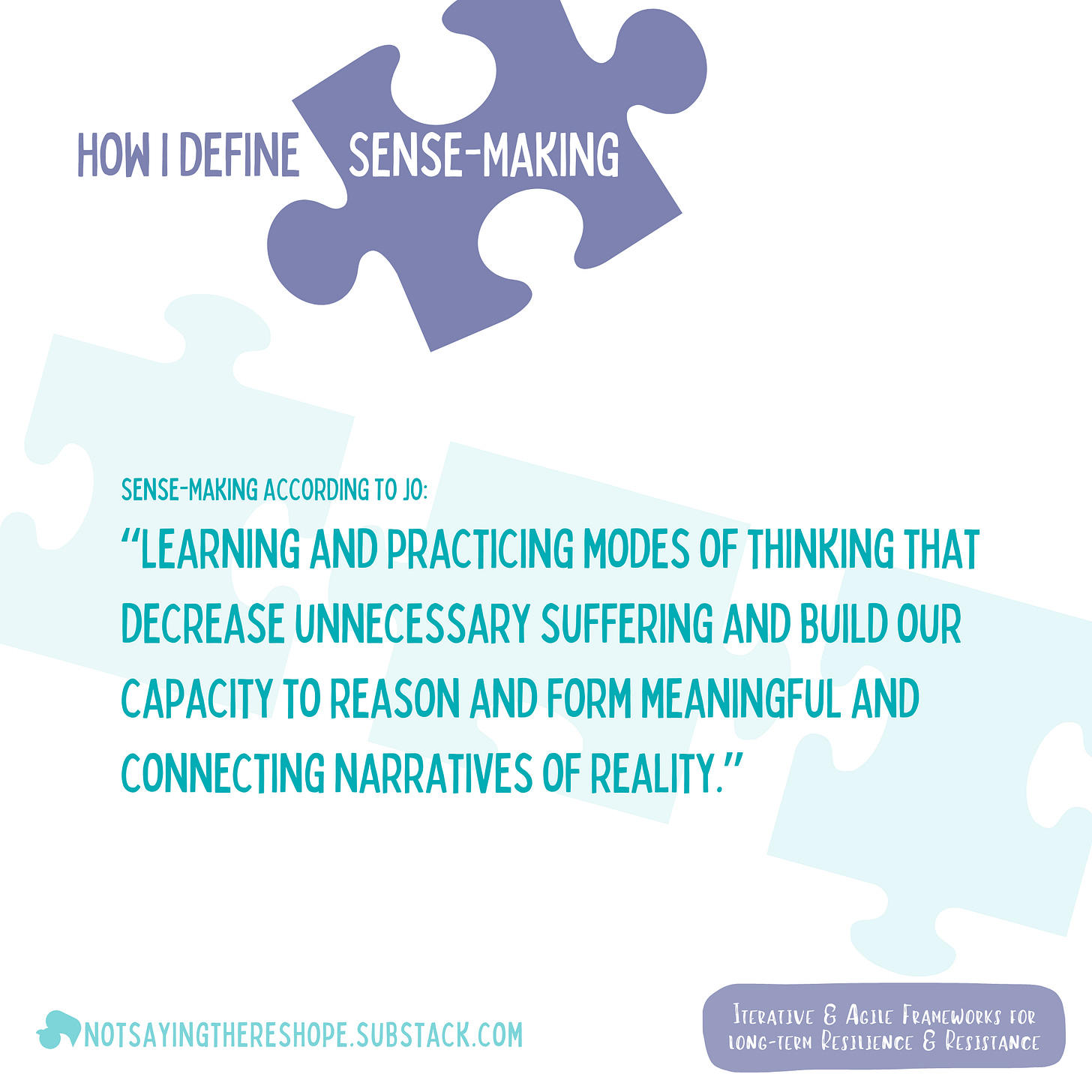The Foundations of a Framework for Sense-Making
In a landscape where shared reality is increasingly rare, how do we make sense of the worlds that are presented to us?
We are a little more than a month away from !naugurat!on day. For those who are new here, the entire motivation for the creation of this substack was to attempt to build and describe frameworks for sustaining the long-haul of this new era of difficulty in the US and abroad. If you only have time to work on building one component of this framework for resilience and res!stance before Jan 2O, go back and read the foundations of a Mosaic of Connection and then focus on reflecting on and building the first iteration of your dynamic mosaic of support by listening to the rhythms and rivers of your life.
What on earth is this non-sense?
Once you have a simple first version of your Mosaic of Connection sorted, the next piece in building an Iterative and Agile Framework for Resilience and Res!stance is starting to develop a clear and robust sense-making framework.
Sense-making (or sensemaking) is a concept that was first developed in the field of organizational psychology by Karl Weich in the late 1960’s (The Social Psychology of Organizing, 1969). Weich proposed a shift from the common view that whole organizations should be the subject of analysis, to a view that what is most essential in organizations is the process of organizing, and how organizations go about that process. Later he describes this act of organizing as organizational/group sense-making or meaning-making, in contrast to organizational/group decision-making. Over time, the sense-making concept was applied outside the field of organizational psychology and the discussion grew to include and debate how best to define and apply it (e.g to intentional group process? subconscious patterns of relating? individual internal processes?).
The concept of sense-making has been helpful to me personally as I have tried to wrestle with how to best make sense of the frantic pace of the changes we’re constantly living in and through. So, with our agile frameworks in mind, and the underlying intent to gather tools for a tool belt that will help us sustainably navigate through these next 2-4-6-40 years, I define sense-making here as, “Learning and practicing modes of thinking that decrease unnecessary suffering and build our capacity to reason and form meaningful and connecting narratives of reality.”
I know that definition is a mouthful, but we’ll unpack what it means over time and how to apply it practically in our day to day lives.
Tools that might make sense.
A video popped up on my YouTube feed the other day with a still image of Brene Brown, a clickbait title, and a voice-over of her giving an inspirational speech. I clicked on it because the title didn’t sound like something Brene Brown would say, but voice cloning technology has gotten so good that it still took me a minute to realize that it wasn’t really her speaking, but an AI script written in the style of Brene Brown using her cloned voice.
How on earth do we begin to make sense of a world in which we can no longer trust what we hear and see? How do we have a conversation when we are living in completely separate information silos? How do we know what is true or not ourselves? How do we find trustworthy sources of information? How do we find our footing with so much uncertainty and unpredictability?
In the next few articles I will unpack some of the tools that may be helpful in building a sense-making framework to support our resilience and res!stance in the years to come. These tools are —
Learning & Unlearning
Meta & Critical Thinking
Reason & Logic Rooted in Compassion & Curiosity
Meaning & Stories that Connect
Reflection questions…
Does this make any sense? ;)
I define sense-making here as, “Learning and practicing modes of thinking that decrease unnecessary suffering and build our capacity to reason and form meaningful and connecting narratives of reality.”
How would you rewrite or edit my definition of sense-making to make it less wordy and/or boring? How would you define sense-making so it’s more reflective of who you are as your unique self?
What tools have you used to make sense of uncertainty and unpredictability individually or in your community? Who taught these to you? Who have you taught them to?
Which of the following tools are you most curious about and why?
Learning & Unlearning
Meta & Critical Thinking
Reason & Logic Rooted in Compassion & Curiosity
Meaning & Stories that Connect









